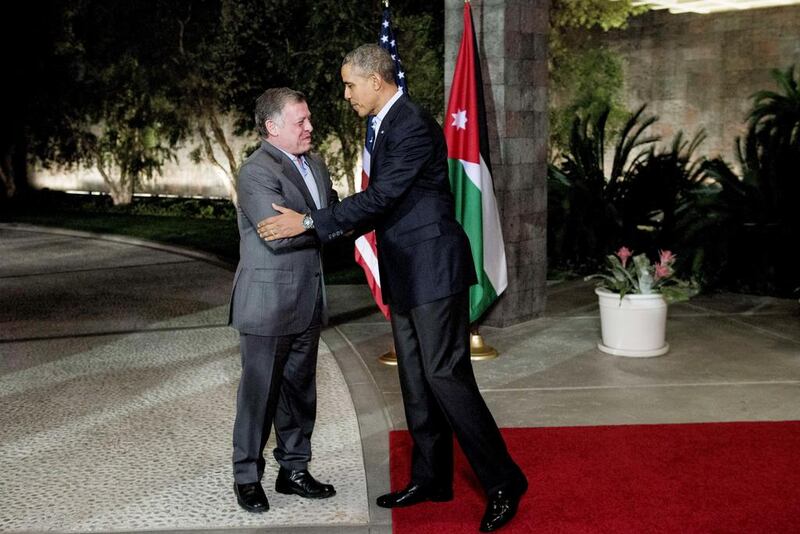Like a stormy marriage, America’s relationship with the Arab world appears to be slowly unravelling.
Long the guarantor of security in the region and, before that, the heir to Britain’s empire and great rival to the Soviet Union, the United States has been more disengaged from the Middle East under Barack Obama than at any time in recent political memory.
What happened? Events, dear boy. The Iraq war tipped America beyond its unipolar moment and the financial crisis entrenched its comparative weakening. America can no longer be everywhere at all times and as the country focuses its resources on the East, and exploits its own energy resources more, the importance of the Middle East diminishes.
If America leaves, where, then, will the Arabs look?
First and foremost, they will look to themselves. The reason the Egyptians are seeking Russian weaponry and the UAE is seeking US fighter jets is because the Arab nations recognise they can no longer depend on any external source for their defence.
Because not merely is the US exiting the region, but other big powers are increasingly unreliable. France’s visit to Iran at the start of this month, with representatives of more than 100 French companies in tow, did not go unnoticed in the Gulf states.
France has been untiring in its attempts to sell fighter jets on one side of the Arabian Gulf. If a nuclear deal with Iran is concluded, the lure of selling to the other side might be irresistible.
Secondly, the Arabs will look to each other. When Saudi Arabia pledged US$3bn (Dh11bn) to Lebanon’s army, it was because the Gulf state understands that it must knit together its alliances against the threat from the Syrian civil war.
The spillover from the conflict is a real threat to the kingdom and to the other Gulf states. The conflict with which it is often compared – the Lebanese civil war – occurred at a very different time in history, a time before transnational jihadism had such a hold on the imagination of some in the Muslim world. It also occurred in a much smaller country, unlike Syria which has large swathes of ungoverned desert.
First Iraq, now Syria have become breeding grounds for radicalism, and the Gulf states understand that whatever happens in the Levant will eventually reach their shores. The time to strengthen their alliances is now.
Ditto with the Gulf’s staunch support for Egypt’s military, and with the desire for closer ties between GCC countries and a joint military command for the armies of the Gulf states. All are part of a broader shift towards entrenching the cooperation with and dependence on one another.
And lastly, the Arabs will look to new alliances. That’s why Saudi Arabia is tentatively formulating a post-US tilt, seeking to put into policies its desire for a more assertive, outward-facing stance. The expected defence and security deal between Saudi Arabia and Pakistan is just one part of this. The military deal between Egypt and Russia is another.
More will follow. The coming years will see something more akin to the 1950s, where there was much realigning of alliances. The most comprehensive of these was what was known as “the Baghdad Pact”, a military alliance that stretched from Pakistan in the east, through Iran and Iraq, to Turkey.
Something similar, in fact if not in name, will surely follow, as Arab states seek alliances to ensure their safety, as the superpower leaves.
In fact, America is not really leaving, at least not any time soon. But the feeling of disengagement, even if it is slight, has serious implications.
Countries like Saudi Arabia, and other Gulf states, will not leave their security to chance, even a slight chance, and especially not with a glowering Iran across the Arabian Gulf. So even a small amount of disengagement has costly, long-term consequences, as countries divert more of their resources towards protecting their borders and deterring threats.
In any case, America’s relationship with the Arabs – if it is, to continue the metaphor, a marriage – is one with much unresolved business.
Even if Egypt tilts slightly away from the US, the United States will need to continue offering the estimated $1.5bn a year to the country’s military – because that aid underwrites the peace treaty with Israel. It is likely, in the medium term, that many of the traditional alliances that the US has in the region will need to be rethought, including the alliance with Israel, as the superpower finds itself less concerned over the problems of the Middle East.
But for now, the US will have to keep paying to maintain the status quo, even as other countries, like Russia, step in to try and change it.
America’s role in the region has sometimes been positive, sometimes negative. And yet, few of this current generation of politicians can imagine a Middle East without it. Like a strained relationship, neither side wants to separate completely, or can fully imagine a life without the other.
falyafai@thenational.ae
On Twitter: @FaisalAlYafai






